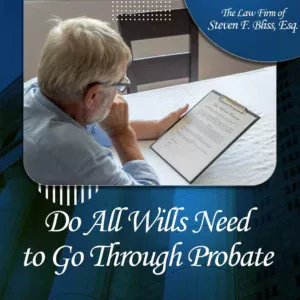In California, most wills do go through probate, but not all estates require a full probate proceeding. Probate is the legal process by which a court oversees the distribution of assets, validates the will, and ensures debts and taxes are paid. While this process is designed to provide fairness and legal oversight, it is often lengthy, costly, and public. For this reason, many Californians look for ways to avoid or minimize probate through strategic estate planning.
 A will alone does not bypass probate. Even if a will is properly drafted and signed, the court must still oversee the administration of the estate to ensure legal compliance. Probate in California is required when the total value of an estate exceeds $184,500, the current statutory threshold. Estates below this limit may use simplified procedures, such as a small estate affidavit, allowing heirs to collect assets without a full probate case.
A will alone does not bypass probate. Even if a will is properly drafted and signed, the court must still oversee the administration of the estate to ensure legal compliance. Probate in California is required when the total value of an estate exceeds $184,500, the current statutory threshold. Estates below this limit may use simplified procedures, such as a small estate affidavit, allowing heirs to collect assets without a full probate case.
Certain types of property do not pass through probate at all, regardless of whether there is a will. Assets held in a revocable living trust, for example, transfer directly to beneficiaries under the terms of the trust. Similarly, accounts with designated beneficiaries, such as retirement accounts, life insurance policies, or payable-on-death bank accounts, bypass probate entirely. Joint tenancy and community property with right of survivorship also allow property to pass automatically to the surviving co-owner.
Probate can also be avoided by properly funding a trust. Many Californians create a living trust but fail to transfer their house or other major assets into it, leaving those items subject to probate. Recording a deed transferring the property into the trust and updating account titles is essential for probate avoidance. This step ensures that the trust, not the probate court, controls asset distribution.
| Asset Type | Probate Required? | California Strategy |
|---|---|---|
| Assets in a Will Only | Yes, if above $184,500 | Full probate required |
| Living Trust Assets | No | Transfer by trustee directly to heirs |
| Beneficiary Accounts | No | Update designations regularly |
| Joint Tenancy Property | No | Passes automatically to co-owner |
| Small Estates | No full probate | Use small estate affidavit |
A valuable tip for Californians is to keep all beneficiary designations updated, as these documents override instructions in a will. Life insurance, retirement accounts, and transfer-on-death deeds are powerful tools to move assets outside of probate. Another strategy is to hold real estate in community property with right of survivorship, which ensures that the surviving spouse inherits without probate. Regularly reviewing estate plans after major life events helps ensure all property is properly structured.
In conclusion, while most wills in California do require probate, not every estate is subject to the process. By using living trusts, beneficiary designations, joint ownership, and small estate procedures, families can minimize or avoid probate entirely. Proper planning ensures that assets pass quickly, privately, and efficiently, reducing the burdens placed on heirs. For Californians seeking to protect their families, understanding and applying these probate-avoidance strategies is an essential part of estate planning.






